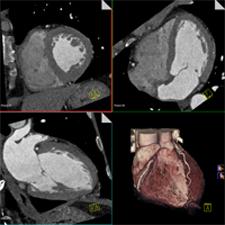
September 27, 2011 — A study in the Sept. 27 issue of the Journal of the American College of Cardiology suggests that early coronary computed tomographic angiography (CCTA) is preferable to rest-stress myocardial perfusion imaging (MPI) when evaluating acute low-risk chest pain in the emergency department. The Society of Cardiovascular Computed Tomography conducted the study.
The Coronary Computed Tomographic Angiography for Systematic Triage of Acute Chest Pain Patients to Treatment (CT-STAT) multi-center trial suggests CCTA is faster, more accurate and less costly than MPI.
The study, led by James A. Goldstein, M.D., and Gilbert L. Raff, M.D., of William Beaumont Hospital, Royal Oak, Mich., ran between June 2007 and November 2008. Low-risk patients were randomized to treatment via CCTA or MPI, and followed up over a period of six months.
The two treatments were analyzed primarily over the time taken to diagnose, and also compared over safety (no major adverse cardiac events in patients with normal index tests), and the cost of care to the emergency department.
The results found CCTA patients were diagnosed 54 percent faster than MPI patients, and the total costs of care were 38 percent lower with the CCTA group. This is significant, given that the cost of each MPI test itself was only slightly greater than the cost for each CCTA test.
Major adverse cardiac events were no different for each diagnostic strategy. The CCTA patients were also exposed to less radiation than the MPI patients (11.5 mSv vs 12.8 mSv, p=0.02).
About 8 million patients in the United States require emergency department evaluation for acute chest pain annually. Currently, extensive testing is required to diagnose or rule out a heart attack in low risk patients without obvious signs. These trial results should have a huge impact in regards to selecting CCTA as a method that is both more efficient and cost-beneficial.
For more information: www.scct.org


 January 05, 2026
January 05, 2026 









